The decision to bring a parrot into your home as a pet is both exciting and multifaceted, encompassing a spectrum of joys and challenges.
Parrots, renowned for their intelligence, vibrant personalities, and potential for deep companionship, offer a unique and interactive experience for pet owners.
However, like any pet, the choice to keep a parrot comes with its set of considerations. This exploration into parrots as pets’ pros and cons aims to provide valuable insights for those contemplating feathered companionship.
From the joys of engaging with intelligent and colorful avian friends to the challenges of noise management, potential health issues, and long-term commitments, this examination delves into the multifaceted nature of parrot ownership.
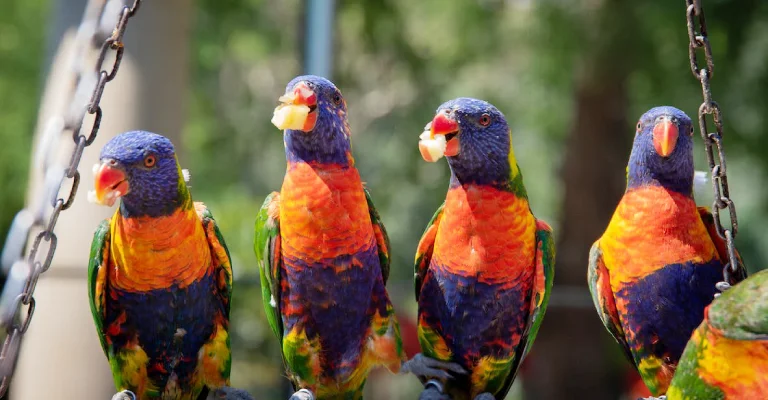
Pros of Parrots as Pets
Parrots can make wonderful pets for the right owners, offering a range of benefits:
Intelligent Companionship
Parrots are renowned for their exceptional intelligence, making them engaging and interactive companions. They can learn tricks, mimic speech, and even solve simple puzzles, providing endless entertainment for their owners.
Their ability to bond with humans enhances the sense of companionship, making them delightful additions to households seeking intelligent and responsive pets.
Vibrant Personalities
Parrots are known for their vibrant and diverse personalities. From the playful and outgoing nature of species like the Budgerigar to the affectionate and charming demeanor of the African Grey, parrots exhibit a wide range of temperaments.
This diversity allows potential owners to choose a parrot species that aligns with their lifestyle and preferences.
Social Interaction
Parrots are highly social animals that thrive on interaction and communication. Keeping a parrot as a pet allows owners to form strong bonds with their feathered friends.
Many species enjoy being part of family activities, and their sociable nature makes them responsive to human interaction, fostering a sense of connection and companionship.
Long Lifespan
Parrots, depending on the species, can have long lifespans, with some living several decades. This longevity offers the opportunity for a lasting and meaningful relationship with a pet.
Responsible ownership, including proper care and nutrition, contributes to the overall well-being and lifespan of the parrot.
Colorful and Aesthetic Appeal
Parrots boast a stunning array of colors and feather patterns, making them aesthetically pleasing pets. Their vibrant plumage adds a touch of natural beauty to the living space, creating an enjoyable and visually stimulating environment for both owners and guests.
Educational Opportunities
Owning a parrot provides valuable educational opportunities, especially for families with children. Learning about the specific needs, behaviors, and characteristics of a parrot fosters a sense of responsibility and respect for animals.
The interactive nature of parrots also encourages owners to continuously expand their knowledge of avian care.
Emotional Support
Parrots have the capacity to form deep emotional bonds with their owners. This companionship can be particularly beneficial for individuals seeking emotional support and a devoted presence.
The affectionate gestures, vocalizations, and responsiveness of parrots contribute to a sense of emotional well-being for their human companions.
High Maintenance Loud Can Be Expensive Can Be Destructive
- High maintenance: Parrots require a lot of attention and care, including regular veterinary check-ups, a healthy diet, and plenty of time for interaction and enrichment activities.
- Loud: Parrots can be quite loud and may screech, squawk or make other loud noises at various times of the day. This can be disruptive for both the owner and anyone else living or working in the same space.
- Can be expensive: Parrots can be expensive to purchase and maintain, with costs including food, toys, cages, and veterinary care.
- Can be destructive: Parrots are known for their ability to chew and shred various objects, which can be destructive to furniture, clothing, and other household items. They also have strong beaks and claws that can be used to damage woodwork and other surfaces.
Cons of Parrots as Pets.
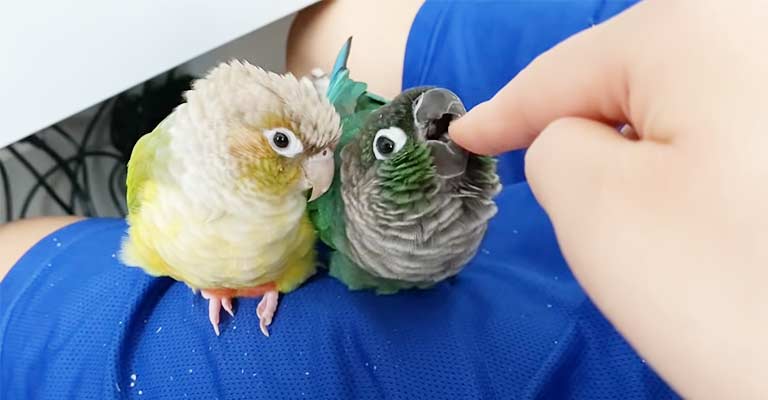
Keeping parrots as pets also comes with several challenges and considerations:
Long-Term Commitment
While the long lifespan of parrots is an advantage, it can also be a challenge for prospective owners. Parrots require a significant, often lifelong commitment in terms of time, effort, and resources.
Potential owners should carefully consider the long-term implications of caring for a pet that can live for several decades.
Noise Levels
Parrots are known for their vocalizations, and some species can be particularly loud. This can be disruptive, especially in shared living spaces or environments where excessive noise is a concern.
Noise management and training are essential, but it’s important to acknowledge that parrots, at times, may not be suitable for noise-sensitive households.
Destructive Behavior
Parrots have strong beaks and a natural instinct to chew. This behavior, while normal for them, can result in damaged furniture, household items, and even potential harm to themselves.
Owners must provide appropriate outlets for chewing, such as toys and branches, to minimize destructive behaviors.
Specialized Dietary Needs
Parrots have specific dietary requirements, and providing a nutritionally balanced diet is crucial for their health. Depending on the species, they may need a variety of fresh fruits, vegetables, nuts, and high-quality pellets.
Meeting these dietary needs can be time-consuming and may require careful research to ensure the parrot receives proper nutrition.
Potential Health Issues
Parrots are susceptible to various health issues, including respiratory problems, feather plucking, and infections. Regular veterinary check-ups are essential to detect and address health issues promptly.
Medical care for parrots can be expensive, and owners should be prepared for potential veterinary costs.
Mess and Dust
Parrots can be messy pets. They produce feather dust, which can settle on surfaces, and their droppings can be frequent and messy.
Regular cleaning is necessary to maintain a hygienic environment, and individuals with respiratory sensitivities should be cautious about potential allergens associated with parrot ownership.
Social Demands
Parrots are highly social animals that require a significant amount of human interaction. Loneliness or lack of mental stimulation can lead to behavioral problems, such as excessive screaming or feather plucking.
Owners should be prepared to invest time in socializing with their parrots, and those with busy schedules may find it challenging to meet these social demands adequately.
Caring for Parrots as Pets
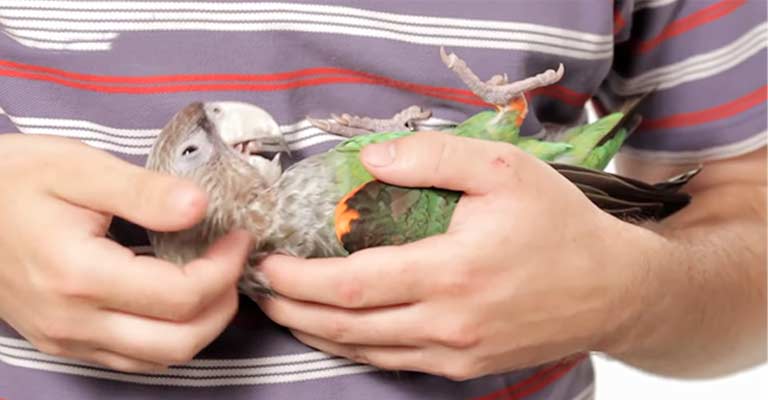
Caring for parrots as pets requires dedication and understanding of their specific needs. Here are key aspects of parrot care:
Feeding and Nutrition
Parrots require a diet that is high in protein and fat, as well as a variety of fruits and vegetables. They should also have access to fresh water at all times.
It is important to research the specific dietary needs of the type of parrot you are considering as a pet, as some species may have different requirements.
Enrichment
Parrots are intelligent and active animals that need mental and physical stimulation. This can be provided through interactive toys, perches, and climbing apparatus.
Parrots also benefit from spending time outside of their cages, interacting with their owners and exploring their environment.
Training and Behavior
Parrots are trainable and can learn a variety of behaviors, such as tricks and commands. Positive reinforcement techniques, such as treats and praise, are effective for training parrots.
However, it is important to understand that parrots can also develop behavioral issues, such as aggression or feather-plucking, and it is essential to address these issues early on with the help of a professional.
Health
Regular veterinary check-ups are important to ensure that parrots are healthy and to catch any potential health issues early on.
Parrots can be prone to certain diseases and conditions, such as feather-plucking, psittacine beak and feather disease, and avian influenza, so it is important to research the specific health concerns of the type of parrot you are considering as a pet.
Overall, Parrots can be wonderful, loving, and loyal companions, but they also require a significant commitment of time, money, and space.
It is important to research the specific needs of the type of parrot you are interested in, as well as your own lifestyle, before making the decision to bring a parrot into your home as a pet.
Which Kind Of Parrot Is Good For Petting?
Let’s discuss which kind of parrot is good for petting:
Budgerigar (Budgie)
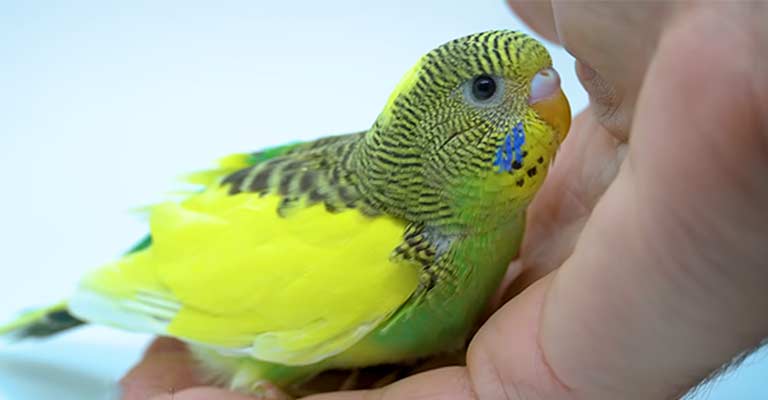
Budgerigars, commonly known as budgies, are one of the most popular and friendly parrot species kept as pets. These small parrots are known for their playful nature, charming personalities, and ability to mimic human speech.
Budgies are relatively easy to care for, making them an excellent choice for first-time bird owners.
Cockatiel
Cockatiels are another wonderful choice for a pet parrot. With their gentle demeanor and melodious whistling, cockatiels are known for forming strong bonds with their owners.
They are often considered affectionate and enjoy interacting with people. Cockatiels are also known for their captivating crest display, which adds to their charm.
Lovebird
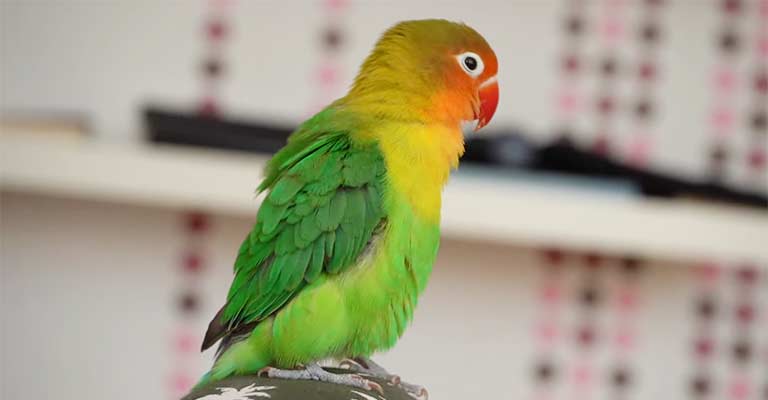
Lovebirds are named for their strong bond-forming tendencies, making them ideal for individuals seeking a companion bird. These small parrots are known for their social nature and affectionate behavior towards their owners.
Lovebirds thrive on interaction, and their lively personalities can bring joy to households.
Senegal Parrot
Senegal Parrots are known for their playful and intelligent nature. They are considered more laid-back compared to some other parrot species, making them suitable for families and individuals alike.
Senegals enjoy socializing and can form strong connections with their owners, providing companionship and entertainment.
Quaker Parrot (Monk Parakeet)
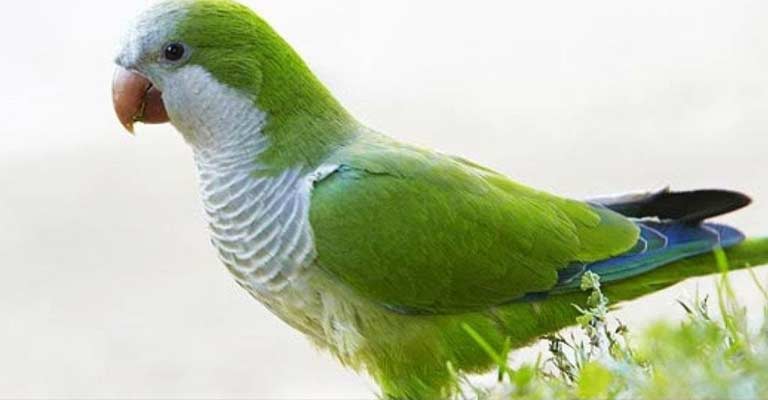
Quaker Parrots are known for their outgoing personalities and playful antics. They are sociable birds that enjoy spending time with their owners. Quakers are also known for their ability to mimic speech and sounds.
While they may be a bit more vocal, their affectionate nature makes them a popular choice among parrot enthusiasts.
Indian Ringneck Parakeet
Indian Ringneck Parakeets are known for their striking colors and intelligent nature. They can be affectionate and enjoy interacting with their human companions.
With proper socialization, Indian Ringnecks can become loving pets that may also showcase their impressive talking abilities.
Eclectus Parrot
Eclectus Parrots are known for their gentle and friendly demeanor. They have vibrant plumage and are relatively calm, making them suitable for families.
Eclectus Parrots form strong bonds with their owners and appreciate mental stimulation through toys and interactive activities.
When choosing a pet parrot, it’s essential to consider the individual needs, temperament, and size of the bird, as well as your own lifestyle and ability to provide proper care and attention.
Additionally, spending time with the bird before making a decision can help gauge compatibility and ensure a positive and enriching relationship.
Comparison of Popular Pet Parrot Species
| Parrot Species | Size | Lifespan | Talking Ability | Price |
|---|---|---|---|---|
| African Grey Parrot | Medium | 40-60 years | High | Expensive |
| Amazon Parrot | Medium-Large | 30-50 years | Medium-High | Moderate-Expensive |
| Cockatiel | Small-Medium | 15-25 years | Low-Medium | Inexpensive |
| Macaw | Large | 30-50 years | Medium-High | Expensive |
| Budgerigar (Budgie) | Small | 5-10 years | Low | Inexpensive |
FAQs
The cost of owning a parrot can vary greatly depending on the species and where you purchase it from. On average, a parrot can cost anywhere from $500 to $10,000. This cost includes the initial purchase price, as well as ongoing expenses such as food, toys, and veterinary care.
Some parrot species are social animals and do better in pairs or groups, while others are fine living alone. It’s important to research the specific needs of the species you’re interested in before making a decision.
It depends on the species and the individual bird. Some parrots are able to entertain themselves with toys and other enrichment while their owner is away, while others may become bored and destructive. It’s best to research the specific needs of the species you’re interested in and make a decision based on that.
Some parrots can be litter trained, but it’s important to keep in mind that parrots are not domesticated animals and may not have the same instincts as cats or dogs when it comes to using a litter box. It’s best to research the specific needs of the species you’re interested in and make a decision based on that.
Some parrot species are considered to be more “beginner-friendly” than others, such as the Budgerigar (Budgie) or the Cockatiel.
These species are known for being relatively low-maintenance and easy to care for. However, it’s important to remember that all parrots require a significant commitment of time, money, and effort to care for properly.
Conclusion
The decision to have a parrot as a pet is a nuanced one that requires careful deliberation and understanding.
The numerous advantages, including the intelligent companionship, vibrant personalities, and emotional support parrots can offer, must be weighed against potential challenges such as noise levels, long-term commitments, and specific care requirements.
Responsible ownership, coupled with a genuine appreciation for the unique characteristics of these birds, can lead to a fulfilling and enriching relationship.
Ultimately, the key lies in informed decision-making, dedication to proper care, and the willingness to embark on a journey of shared experiences and mutual understanding with these remarkable feathered companions.